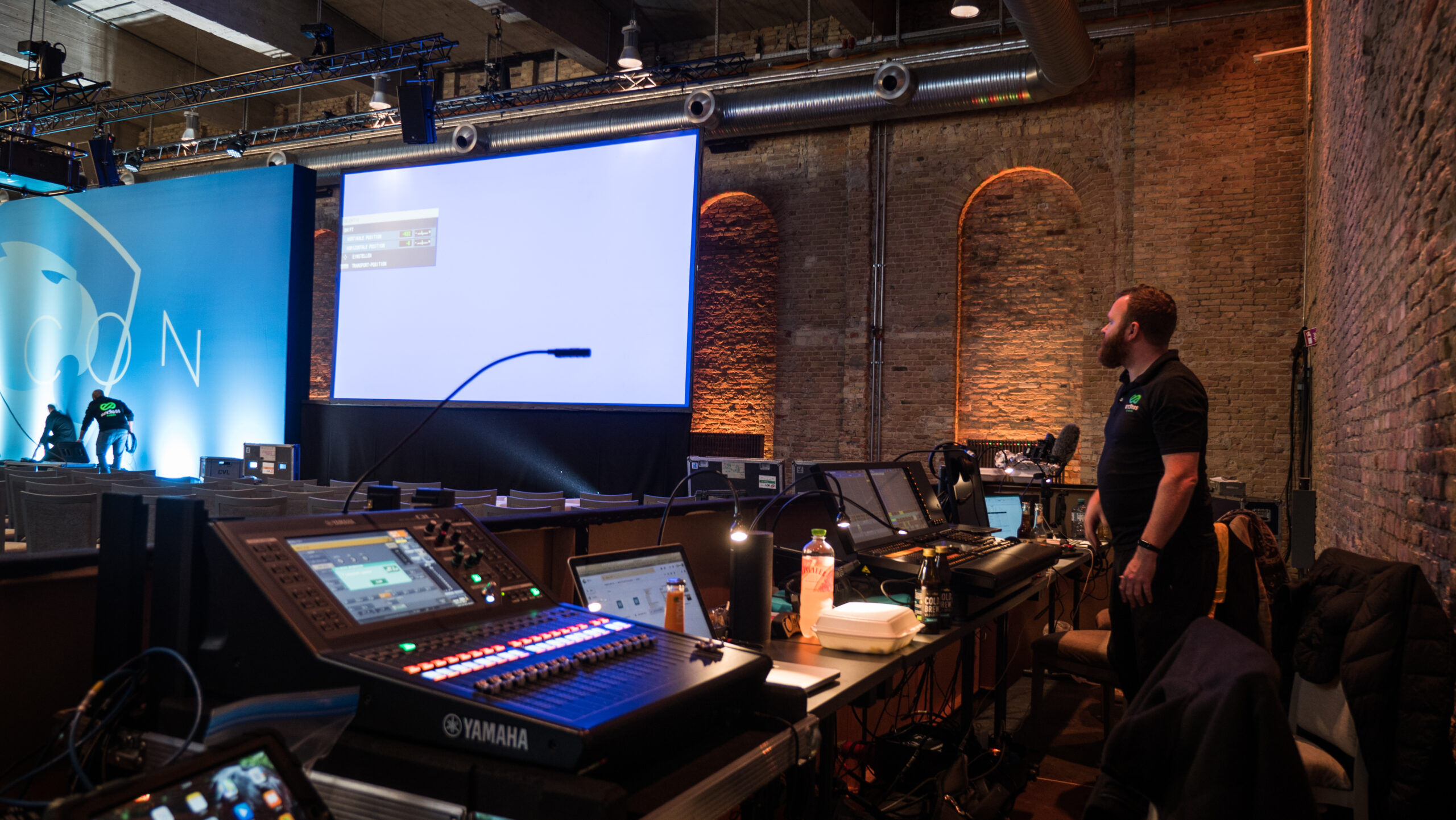Exactly How Event Production Works: A Comprehensive Check Out the Refine
Event production is a complex and structured process that requires mindful preparation and implementation. It starts with developing clear objectives and recognizing the target audience. Each step, from budgeting to location choice, plays an essential function in making certain success. As the process unravels, various elements have to straighten seamlessly. Yet, the nuances of this detailed operation usually go undetected. What are the essential stages that add to a memorable event?

The First Drawing Board
When starting on event production, cautious preparation is vital to guarantee an effective result. The preliminary drawing board acts as the foundation for all subsequent initiatives. Throughout this phase, event producers should specify the event's function and purposes clearly. Recognizing the target market helps tailor the experience and messaging, ensuring relevance and engagement.Producers have to likewise consider the event style, whether it be in-person, online, or hybrid, as this will influence various logistical elements. Picking an appropriate day and venue is vital, as it impacts ease of access and availability.Furthermore, setting up a reliable team is essential for splitting responsibilities and streamlining communication. Establishing a timeline with milestones warranties all jobs are finished on time. This phase entails thorough research, including recognizing possible challenges and devising methods to alleviate threats. Eventually, a well-structured preliminary preparation stage sets the tone for a successful event production journey.

Budgeting and Source Appropriation
In event production, efficient budgeting and source allocation are vital for success - event production charlotte. Establishing monetary criteria sets the foundation for all succeeding decisions, while resource distribution techniques assure that every part of the event is adequately supported. Together, these aspects aid keep control over expenses and optimize using readily available sources
Establishing Financial Parameters
Establishing monetary criteria is crucial to the success of any event production, as it establishes the structure for effective budgeting and source allocation. This procedure begins with specifying the overall budget plan, which incorporates all facets of the event, including location prices, catering, and advertising and marketing. By determining readily available funds, event coordinators can prioritize expenditures and allocate resources appropriately. In addition, it is necessary to carry out complete market study to prepare for prospective prices and recognize funding sources, such as sponsorships or ticket sales. Establishing clear financial specifications additionally aids in risk administration, enabling organizers to allot backup funds for unexpected expenses. Ultimately, a well-defined budget serves as a roadmap, directing the event production group towards accomplishing their goals while preserving monetary control.
Source Distribution Strategies
Effective resource distribution methods are essential for optimizing the impact of an occasion while adhering to budget plan restraints. Effective event production needs a thorough technique to budgeting and resource allotment. Planners need to focus on necessary components such as place, food catering, and technology, guaranteeing that funds are allocated to areas that boost attendee experience. An in-depth spending plan needs to describe expected expenditures and identify locations for potential cost savings, such as discussing with suppliers or exploring sponsorship chances. In addition, tracking expenses throughout the preparation process helps avoid overspending. By using tactical resource distribution, event producers can deliver an unforgettable experience while preserving financial obligation, eventually adding to the total success of the event.
Location Selection and Logistics
Choosing the ideal place is important to the success of any event, as it establishes the stage for the overall experience. Place selection entails examining different factors, including capability, availability, and area. Organizers should consider the target market and the nature of the event, making sure the location straightens with the event's goals.Logistics play a significant duty in this process, involving plans for seating, audiovisual equipment, and providing services. A well-chosen place ought to assist in smooth flow for guests and team, improving engagement.Additionally, examining possible venues for amenities like vehicle parking, toilets, and fire escape is essential for safety and benefit. The timeline for safeguarding the location is likewise important, as preferred locations may reserve swiftly - event production charlotte. As a result, thorough planning and prompt implementation can eventually add to a seamless event experience, making location option and logistics essential components of effective event production
Imaginative Concept Development
While the venue establishes the physical stage, creative concept development forms the event's identification and story. This process begins with determining the event's objective and target market, permitting event producers to formulate a compelling theme that resonates with participants. Brainstorming sessions frequently include varied point of views, cultivating innovative concepts that straighten with the event's goals.Once a motif is developed, aesthetic aspects such as shade palettes, signage, and style are made to boost the overall environment. Narration strategies may additionally be integrated to develop an engaging trip for participants, assuring a remarkable experience. In addition, considerations regarding home entertainment, tasks, and interactive parts are aligned with the picked concept, reinforcing the motif throughout the event.Ultimately, reliable innovative principle growth assurances that every aspect of the event works cohesively, leaving a lasting perception on participants and satisfying the event's objectives. This fundamental job prepares for subsequent preparation and implementation phases.
Collaborating With Suppliers and Suppliers
Effective event production depends upon efficient cooperation with suppliers and distributors. Selecting reliable partners, negotiating agreements effectively, and making sure timely deliveries are vital action in this procedure. Each of these variables contributes significantly to the total success and smooth execution of an event.
Choosing Reliable Allies
Exactly how can event organizers guarantee a seamless production experience? Selecting trustworthy companions is crucial in attaining this goal. Event organizers have to conduct thorough study to determine vendors and distributors with a proven performance history of excellence. This includes checking references, like it evaluating profiles, and reviewing consumer comments. Coordinators should focus on partners that show professionalism, timely communication, and a readiness to work together. Building solid connections fosters depend on and allows fast analytical throughout the event. Furthermore, it is helpful to select regional suppliers that understand the place and local logistics. Inevitably, an effective event rests on the harmony between coordinators and their companions, making sure that every facet of production runs smoothly and successfully.
Negotiating Agreements Successfully
Efficient arrangement of agreements is a vital action in the collaboration in between event coordinators and their suppliers and suppliers. This process includes clear interaction of expectations, deliverables, and timelines. Planners should carry out extensive study on market prices and industry requirements to develop a standard for settlements. It is essential to create a joint atmosphere, encouraging open discussion about terms, prices, and prospective contingencies. Organizers should likewise prioritize comprehending the vendor's capabilities and limitations to straighten their requirements efficiently. Versatility can result in mutually advantageous arrangements, fostering long-lasting connections. Crafting distinct contracts that include details performance metrics can assist ensure responsibility, ultimately bring about successful event implementation and fulfillment for all events involved.
Guaranteeing Prompt Deliveries
Timely distributions are important for the smooth implementation of any kind of event, needing attentive cooperation in between organizers and their vendors and suppliers. Efficient interaction is blog here vital, as it assists establish clear expectations concerning shipment timetables, amounts, and specific demands. Planners often produce in-depth timelines to detail essential landmarks, making certain all parties remain straightened throughout the process. Normal check-ins with vendors can aid identify possible hold-ups early, enabling for aggressive services. Additionally, developing strong relationships with trustworthy vendors fosters count on and liability, which can cause much better solution and prioritization. By focusing on these collaborative efforts, organizers can lessen disruptions, therefore improving the general performance of event production and making certain that all essential products and solutions show up as intended.
Marketing and Promo Methods
While organizing an occasion, the success of marketing and promo techniques can substantially influence attendance and involvement. Efficient strategies usually include a mix of digital marketing, standard marketing, and grassroots outreach. Using social networks systems permits real-time interaction and targeted advertising, reaching certain demographics efficiently. Email advertising and marketing campaigns can even more engage prospective guests with personalized web content and reminders.Collaborations with influencers or industry leaders can likewise enhance integrity and broaden reach. Creating engaging material, such as videos or blog sites, assists to generate buzz and suffer passion leading up to the event. In addition, leveraging early-bird price cuts and unique advantages can incentivize ticket purchases.Promoting with conventional networks, such as posters or local media, continues to be relevant, particularly in community-focused occasions. A thorough technique that integrates multiple strategies warranties maximum presence and interaction, eventually adding to the event's success and the production of a remarkable experience for attendees.
On-Site Execution and Monitoring
On-site implementation and monitoring are vital components that determine the general success of an event. Effective coordination throughout the event assures that all aspects line up with the planned agenda. Event supervisors manage logistics, including supplier control, devices arrangement, and guest site link solutions. Keeping track of timelines and dealing with any type of unforeseen problems are fundamental for preserving a smooth experience.The staff plays a substantial duty, as qualified workers are accountable for numerous tasks such as registration, info dissemination, and technical support. Communication amongst group participants is important; it promotes a joint atmosphere and enables quick resolution of challenges.Additionally, safety methods should be stuck to, protecting the health of all attendees. Post-event evaluations are also part of on-site monitoring, supplying understandings for future enhancements. By concentrating on these elements, event producers can develop memorable experiences that fulfill or exceed participant assumptions while achieving the event's objectives.
Frequently Asked Inquiries
Exactly how Do I Pick the Right Event Motif?
Choosing the ideal event style entails taking into consideration the target audience, event objective, and venue. Investigating present trends and gathering input from stakeholders can likewise motivate imaginative ideas that reverberate and create an unforgettable experience.

What Are Usual Blunders in Event Production?
Common mistakes in event production frequently consist of poor planning, bad interaction amongst staff member, budget mismanagement, overlooking to take into consideration the audience's needs, and failing to carry out a comprehensive post-event analysis for future improvements.
Just How Can I Gauge Event Success?
To measure event success, one can evaluate attendee complete satisfaction, interaction levels, budget adherence, and post-event feedback. Key performance indications, such as ticket sales and social media interactions, also offer useful insights right into total efficiency.
What Should I Do if It Moistens the Event Day?
In the event of moisten the day, the organizer should carry out backup plans, such as safeguarding tents or relocating activities indoors. Communication with attendees regarding changes is vital to guarantee a smooth experience regardless of weather condition challenges.
Just How Can I Guarantee Guest Involvement During the Event?
